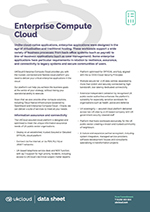Q Do I get root access onto the local VM?
Yes, as this is a true IaaS cloud service, you have complete control and autonomy over each VM, and so have full ‘root’ or administrative access.
Q What VM sizes are available?
UKCloud offers a variety of ‘T-shirt sizes’ to meet customers’ needs. The smallest configuration is 512MB and 1 vCPU. The largest is 96GiB memory with 8 vCPU.
Check the Compute service description for more details on the currently available sizes.
Dedicated Compute provides the flexibility to build custom-sized VMs.
Q Can I resize my VM?
Yes, you can change processor, memory and storage allocations via the self-service UKCloud Portal and API.
Processors and memory can be added to or removed from VMs if the OS supports the ‘hot add’ capability.
Increasing CPU or memory allocations may result in the VM being billed at a higher rate.
Additional VM storage can be allocated instantly and will be billed on a per GiB basis.
Q What is the speed of each vCPU?
This is set at 2GHz for all VMs except Micro sized VMs, which can be restricted to run at 500MHz.
Q What is the fastest way of importing large amounts of data onto the UKCloud platform?
The speed of data transfer to the UKCloud platform isn’t guaranteed. However, during tests of the upload and download speeds, an average of 8 Mbit/s was achieved for VM import/export and 40 Mbit/s for data transferred over FTPS.
For a transfer time calculator, go to: http://techinternets.com/copy_calc?do
If you use FTPS to upload data to or download it from your environment, you can transfer up to 1TiB of data in a day.
Alternatively, we offer the Mass Transfer Facility option enabling customers to import large quantities of data via HDDs or NAS devices that are plugged directly into your environment. Please check the Mass Transfer Facility service scope on the UKCloud Knowledge Centre or the price guide further details.
Q Does UKCloud offer encryption on the VM?
Not by default but, if it’s required, you can implement it using technology of your choice.
Q Is UKCloud’s encryption service available for compute?
Not currently, but we are looking into options for G‑Cloud 9.
Q Is it possible to non-fast-provision vApps, and to convert current vApps into non-fast provisioned ones?
Fast provisioning is done only by customer request – by default, all vApps are non-fast-provisioned. Customers can right-click on a VM and consolidate. This can also be done via a Service Request.
Q What is Dedicated Compute?
Dedicated Compute comprises of physical blades assigned to a customer for their sole use. They’re managed using the standard tools and services in the UKCloud Assured cloud platform.
Dedicated Compute allows customers to:
- Comply with legacy licensing requirements from software suppliers whose licensing is based on a physical CPU (such as Oracle or desktop OSs)
- Build bespoke sized VMs on the UKCloud Assured cloud platform
Dedicated Compute uses the same storage infrastructure as the shared compute platform
There’s a longer deployment lead time for Dedicated Compute, as well as a longer contractual commitment than our shared cloud platform (three months rather than one hour).
For more details, please see the Compute service description available via the Digital Marketplace.
Q Can I utilise multiple storage types with my VM?
UKCloud offer three storage types to customers:
- Tier 1 which is a fast storage offering
- Tier 2 which is a standard storage offering
- Geo-resilient which is utilised by the synchronous protection technology
With Tier 1 and Tier 2 storage, customers can utilise both types to deliver their solutions – including running VMs utilising disks on different storage types.
Customers can not mix geo-resilient storage with any other storage type attached to a VM. So customers cannot leverage Geo-Resilient Storage in conjunction with Tier 1 or Tier 2 storage types.
Q Can I change between storage types associated with the VMs I’ve deployed?
If a customer has both Tier 1 and Tier 2 storage profiles available, they can self-migrate between these storage types.
Migration from, or to, Geo-Resilient storage and other storage types (Tier 1 and Tier 2) is an activity that can only be performed by UKCloud.

